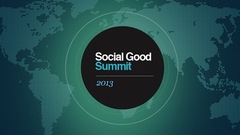It's been quite difficult for me to blog about the Coursera
How to Change the World course I'm doing, for a number of reasons. The first is that the problems and issues that we're exploring are vast and complex, and covering social goods, poverty, climate change, disease and health care, women;s rights, education and social change in seven weeks is rushed, and at times, feels superficial. Another is that every time I learn something new, I'm ashamed that I didn't already know it. The world is a small place these days and if my neighbour is suffering, and I can help, I should make it my business.
My son tells me I don't need a university course - I should just spend a few hours on
Tumblr, and I've done that and will continue to do so, but there's something to be said for having a formal, well-thought through structure for self-education, and
for allowing some time (no matter what else is happening) to read carefully (rather than scan), think
through that reading, and then, in a curated way, applying it
to a local context where a little effort can actually make a significant positive difference. How to Change the World is
very thoughtfully curated, and despite the grandiose title,
Michael S Roth approaches the issues carefully and humbly, acknowledging that he's learning along with us, and always allowing local and engaged activists to have the final say and present an insider perspective using a variety of media, and encouraging students to use a variety of tactics and media in the assignments. This week we've focused primarily on climate change, and though I well knew about the inherent challenges of our changing climate, the course has encouraged me to take a positive approach and to see every thing that I can do, whether it's as simple as assessing and then finding ways to decrease my own (fairly considerable, it turns out) footprint, or getting more broadly involved in sustainability projects, as valuable. Every week I've begun by thinking "this is an issue that is particularly important to me." This week, which is no exception, is Disease and Global Health Care, and I look forward to watching the videos, delving into the readings, and then applying the learning in a way that is relevant to my life and uses my capabilities. It may be small, and a little superficial. I can't deny that I'm still ashamed about that. But doing nothing or becoming overwhelmed is no solution to shame. I have to start somewhere, sometime, and here, and now, seems to me to be right.
 A Slow Combusting Hymn
is a brand new, hot-off-the-press poetry anthology featuring poetry from and about Newcastle and the Hunter Region
, edited by the dynamic duo Jean Kent and Kit Kelen. The book's cover features a beautiful painting by local artist Claire Martin. I am very proud to have a number of poems
A Slow Combusting Hymn
is a brand new, hot-off-the-press poetry anthology featuring poetry from and about Newcastle and the Hunter Region
, edited by the dynamic duo Jean Kent and Kit Kelen. The book's cover features a beautiful painting by local artist Claire Martin. I am very proud to have a number of poems
